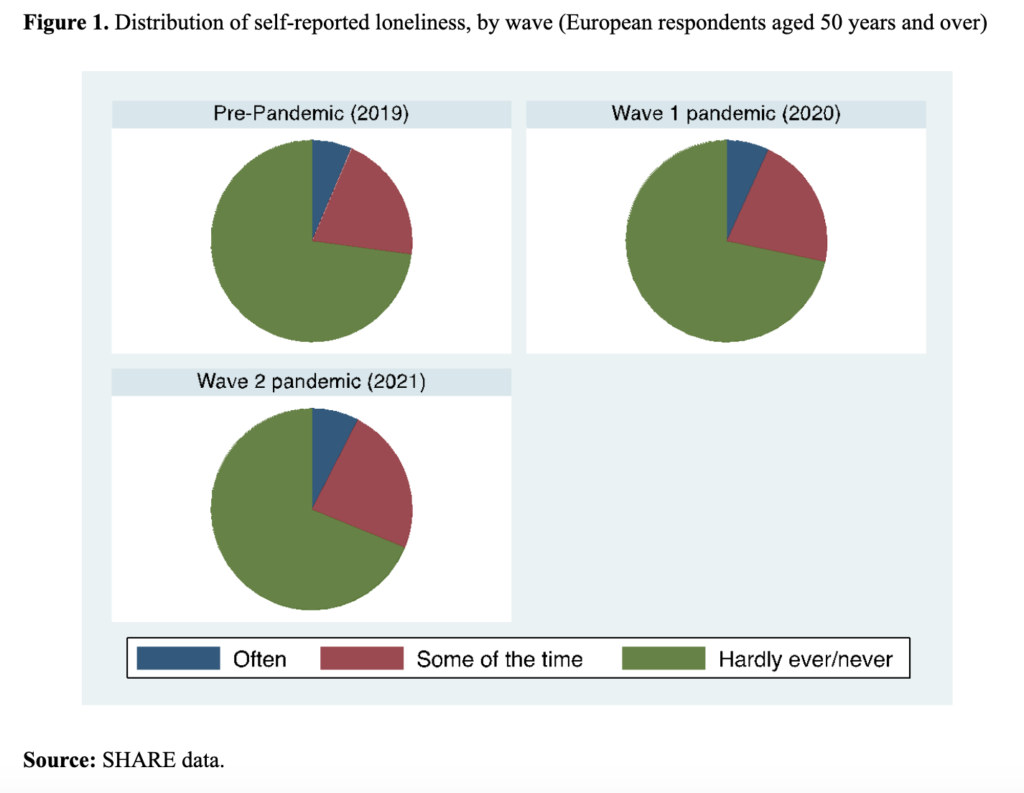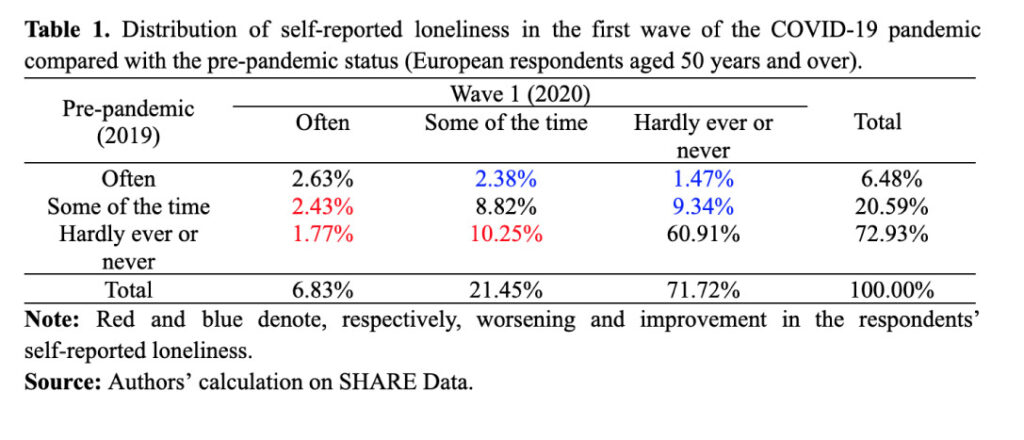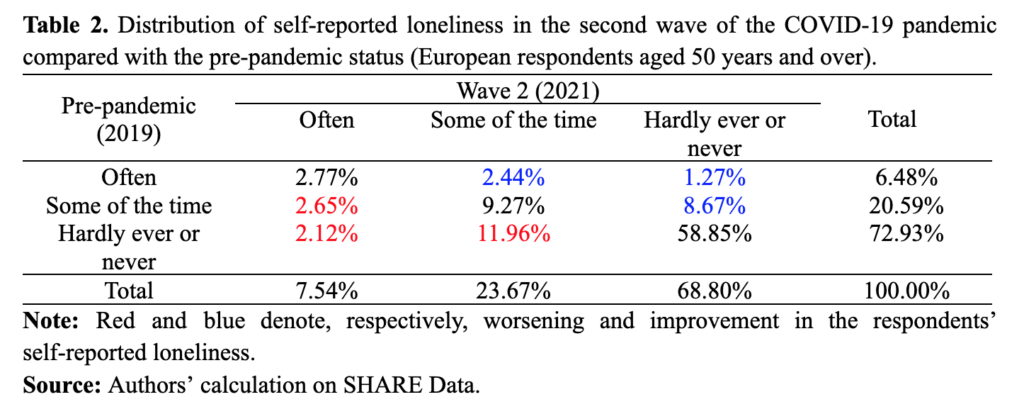
Feelings of loneliness are not very widespread among European older adults (aged 50 years and over) according to SHARE data. And, surprisingly enough, according to the analysis of Omar Paccagnella, Veronica Cassarà, Maria Iannario, and Cosmo Strozza, the COVID-19 pandemic did not affect these feelings very much: those whose self-reported status worsened broadly match those who reported an improvement.
Introduction
The COVID-19 pandemic has caused enormous psychological, social, and economic harm worldwide. Public health measures adopted to fight the spread of the virus, such as limitations of social and physical contacts, may have exacerbated loneliness and social isolation among younger and older adults. Loneliness is a state of emotional distress arising from a discrepancy between desired and actual social interactions. It should not be confused with social isolation, as not all individuals with limited social interactions feel lonely.
Several studies suggest that older adults, despite a higher risk of social isolation, were more resilient to loneliness during the COVID-19 outbreak than younger people (Arpino et al., 2020; Luchetti et al., 2020). However, research is needed to correctly identify who felt lonely during the COVID-19 pandemic and who felt lonely because of the COVID-19 pandemic.
Who feels lonely?
To provide a clearer picture of this issue, we exploited data collected by the Survey of Health, Ageing and Retirement in Europe (SHARE) before and during the COVID-19 outbreak. More specifically, we analysed data collected in the eighth wave of SHARE, carried out in 2019/2020 (Börsch-Supan, 2022a), the first SHARE Corona survey, carried out in 2020 (Börsch-Supan, 2022b), and the second SHARE Corona survey, carried out in 2021 (Börsch-Supan, 2022c).
In these waves, the same question (“How often do you feel lonely?”) was asked with three possible answers:
1) Often2) Some of the time3) Hardly ever or never.
Figure 1 displays the distribution of self-reported loneliness before and during the COVID-19 pandemic, selecting only the respondents who participated in all of these waves (n=31,250). It shows that the proportion of individuals never (or hardly ever) reporting loneliness was very large (more than two thirds of respondents) and declined over time. However, while this comparison highlights who feels lonely in different periods of time, it cannot be conclusive about the role of the pandemic in causing loneliness.

To further investigate this issue, we exploited the additional question asked in both SHARE Corona surveys: “Has that been more so, less so or about the same [as before the outbreak of Corona/than during the first wave]?”. Here, the possible answers were:

To further investigate this issue, we exploited the additional question asked in both SHARE Corona surveys: “Has that been more so, less so or about the same [as before the outbreak of Corona/than during the first wave]?”. Here, the possible answers were:
1) Less so2) About the same3) More so.
Unfortunately, this question was asked only to those who reported feeling lonely “often” or “some of the time” in the first SHARE Corona survey and to all respondents (whatever their feeling) in the second Corona survey, so the results cannot be compared. Moreover, they should be interpreted with caution since these are self-assessments of loneliness status and answers may suffer from individual heterogeneity in reporting feelings.
A different view: changes in loneliness
To identify those who felt lonely because of the COVID-19 pandemic, we focused on respondents who reported a change with respect to their pre-pandemic status, although even this strategy may not be flawless, as for some of these respondents the change may be due to other reasons (e.g., the loss of a loved one). However, this approach has the advantage of removing individual heterogeneity and allows us to identify both deterioration and improvement of self-reported loneliness resulting from different reactions to the measures put in place to contain the virus.
Tables 1 and 2 summarise the results obtained with our strategy. More than 70% of the older respondents show no change in loneliness with respect to the 2019 evaluation (the total percentages in the main diagonal). This does not mean that they did not feel lonely, but rather that their reported level of loneliness did not change during the pandemic period. Indeed, it is interesting to note that about 2.7% of the respondents (combining the two surveys) rated themselves as often lonely both before and during the COVID-19 outbreak.


The proportion of individuals who reported any type of deterioration of their status (14.5% and 16.7%, respectively, during the first and the second COVID-19 waves) is somewhat low and comparable with the proportion of those reporting improvement (13.2% during the first wave and 12.4% in the second wave). Moreover, only about 2% of respondents (slightly more in the second wave) reported a strong increase in their feelings of loneliness.
Summing up, this brief discussion can help to identify people whose feelings of loneliness really changed during the COVID-19 outbreak. In future research, we will investigate the characteristics of those who did not report any change. Our conjecture is that they represent a group of individuals whose feelings were barely affected by the pandemic, and this could provide a first step towards studying resilience to the COVID-19 crisis among older people.
References
- Arpino B, Mair CA, Quashie NT, Antczak R (2022). Loneliness before and during the COVID-19 pandemic – are unpartnered and childless older adults at higher risk? European Journal of Ageing19, 1327-1338
- Börsch-Supan A (2022a). Survey of Health, Ageing and Retirement in Europe (SHARE) Wave 8. Release version: 8.0.0. SHARE-ERIC. Data set. DOI: 10.6103/SHARE.w8.800
- Börsch-Supan A (2022b). Survey of Health, Ageing and Retirement in Europe (SHARE) Wave 8. COVID-19 Survey 1. Release version: 8.0.0. SHARE-ERIC. Data set. DOI: 10.6103/SHARE.w8ca.800
- Börsch-Supan A (2022c). Survey of Health, Ageing and Retirement in Europe (SHARE) Wave 9. COVID-19 Survey 2. Release version: 8.0.0. SHARE-ERIC. Data set. DOI: 10.6103/SHARE.w9ca.800
- Luchetti M, Lee JH, Aschwanden D, Sesker A, Strickhouser JE, Terracciano A, Sutin AR (2020). The trajectory of loneliness in response to COVID-19. American Psychologist 75, 897-908
No comments:
Post a Comment